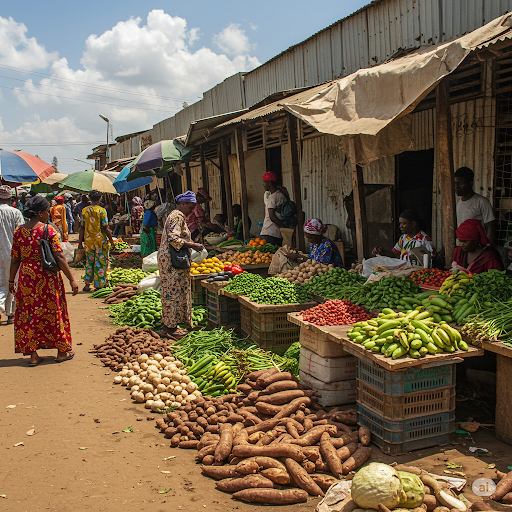Broadcasting
Application Now Open for 2023 Anzisha Prize fellowship for Young Entrepreneurs

The Anzisha Prize is a leading venture-building program championing young African entrepreneurs between the ages 15 and 22. The initiative has officially opened applications for the 2023 cohort and can be accessed on anzishaprize.org/apply.

African changemakers who are under 22 years old and are running businesses and creating employment opportunities for their peers are encouraged to apply. Thirty fellows will then be selected for a three-year fellowship and receive business consulting support, over $5000 in cash stipends and coaching services from a team of experts.
“Application season is always an exciting time for the program because we get to see how Africa’s youth are thinking innovatively to solve some of our pressing issues. For the past few years, we’ve seen an increase in Agri-Tech and Fin-tech businesses that are reshaping how we do business on the continent,” says Selection Lead, Suzan Kibirige for The Anzisha Prize. “What I enjoy most about this work is seeing how tenacious young people are. They never take no for an answer and that is what we need.”
The Three-Year Fellowship at a glance
The fellowship supports the growth of young entrepreneurs and recognises and incentivises their achievements – big and small. Through an individual and collective entrepreneurial development journey, the fellowship focuses on key areas of support: Business Development and Personal Leadership. During the fellowship, entrepreneurs will have access to a plethora of tools, resources, and experiences, and access to a dynamic entrepreneurial ecosystem. Every six months, entrepreneurs will unlock key features such as cash stipends or experiential learning workshops and courses based on predetermined milestones they have achieved. At the end of the second year, entrepreneurs will pitch their improved business and plans for a chance to win their share of grand cash prizes valued at over $50 000.
Since 2011, Anzisha Prize, a partnership between Mastercard Foundation and African Leadership Academy, has supported and celebrated the entrepreneurial endeavours of very young people. The program alumni network includes 202 entrepreneurs who have gone on to create businesses that have transformed their communities. To date, just 130 of these fellows have created 8708 employment opportunities and have raised over $6 million in investments.
The fellowship has been an integral program in ensuring that young African entrepreneurs are celebrated and nurtured on their path to creating sustainable futures for those around them. “We encourage young job creators to apply for this opportunity and we are looking forward to championing their efforts, as creating clear pathways for young people to succeed is a core goal for Mastercard Foundation,” says Mastercard Foundation and African Leadership Academy
Some of the entrepreneurs include alumni Joan Nalubega, a Ugandan entrepreneur who has proven that social entrepreneurship can be profitable. Having grown up as an orphan and battling Malaria-related illnesses as a young woman, Nalubega established Uganics – a company that produces anti-Malaria products to combat Malaria in the country.
Another notable entrepreneur is South African Karidas Tshintsholo. Tshintsholo’s business, Khula!, is one of the most admired African startups among investors. The startup’s business-to-business (B2B) marketplace helps small-scale farmers bring their products to formal markets, by offering them cost-effective logistics services. The company has signed up more than 3000 farmers, and over 100 suppliers now work with the company.
Those selected as Anzisha Prize fellows will become members of an active and dynamic community of changemakers across Africa who are exploring how to drive, scale, and make positive and lasting change in their communities through entrepreneurship.
The Anzisha Prize program is open to young people who are running businesses operating in any sector on the continent. Prospective applicants are encouraged to apply before the closing date of 27 November 2022. Entrepreneurs are advised to download the application guide and apply for the prize at anzishaprize.org/apply.
Broadcasting
5 Things You Absolutely Need to Know About BBNaija Season 10


Broadcasting
E-commerce Lessons for Scaling Nigeria’s Food Distribution

By Diana Tenebe, Chief Operating Officer, Foodstuff Store
Nigeria stands at the cusp of an agricultural revolution with the ambitious plan to significantly transform its food and agriculture sector through the launch of the $510 million Special Agro-Industrial Processing Zones (SAPZ), financed by the African Development Bank and development partners. Fueled by the integration of cutting-edge technologies aimed at boosting food production and ensuring national food security. However, as yields increase, a formidable hurdle remains: the efficient and scalable distribution of this bounty across the nation’s diverse landscapes, often hampered by infrastructural limitations and logistical complexities.

Dr. Bosun Tijani, the Minister of Communication, Innovation, and Digital Economy, recently called on Nigerian farmers to prepare for digital and technologically advanced farming methods, emphasising their crucial role in boosting food production and security. Building upon this call for technological integration, and to truly unlock the full potential of Nigerian agriculture and ensure increased harvests translate to accessible and affordable food for all, the sector can draw invaluable lessons from the operational prowess of e-commerce giants like Amazon. Their success in navigating complex logistics and reaching vast customer bases offers a compelling blueprint for transforming Nigeria’s food distribution network.
Amazon’s dominance in the e-commerce realm is underpinned by a meticulously crafted logistics and supply chain system. Their significant investments in sprawling fulfillment networks, coupled with the strategic deployment of technology for route optimisation and real-time inventory tracking, have created an unparalleled engine for moving goods swiftly and efficiently. Furthermore, their optimisation of last-mile delivery, integration of automation within warehouses, and a hybrid approach blending in-house capabilities with shrewd partnerships underscore their commitment to scalability. This intricate ecosystem is designed to handle massive volumes and adapt to fluctuating demands – a crucial capability that Nigeria’s agricultural sector desperately needs.
Translating these principles to the Nigerian context requires a fundamental shift towards building a resilient delivery infrastructure specifically tailored for agricultural produce. This necessitates moving beyond traditional, often inefficient methods and embracing hybrid transportation models that account for varying road conditions and geographical challenges. Imagine a network that leverages a combination of refrigerated trucks for long-haul transport, smaller vehicles for navigating local terrains, and even innovative solutions like riverine transport where feasible. Integrating technologies like GPS tracking for real-time visibility of produce movement and strategically establishing a network of collection and distribution hubs across key agricultural zones can significantly streamline the flow of goods.
Implementing robust systems for real-time tracking of harvests and produce, mirroring Amazon’s inventory management, will be crucial in minimising spoilage and maximizing freshness as food travels from farm to consumer. Moreover, forging strategic alliances with existing local logistics providers, leveraging their on-the-ground knowledge and infrastructure, can provide a vital springboard for building a comprehensive network without starting entirely from scratch.
Beyond the physical movement of goods, the power of data, a cornerstone of Amazon’s success, holds immense potential for revolutionising Nigerian food distribution. Leveraging data analytics can provide invaluable insights into regional demand patterns, allowing for more accurate forecasting of optimal harvest and distribution times. This data-driven approach can help match agricultural supply with consumer needs with greater precision, reducing waste and ensuring that the right produce reaches the right markets at the right time – much like Amazon utilizes data for personalized recommendations and understanding customer purchase behavior. Imagine farmers making informed decisions about planting based on predicted market demands or logistics providers optimizing routes based on real-time demand fluctuations.
Furthermore, adopting Amazon’s unwavering focus on customer convenience and trust is paramount, especially when dealing with perishable goods. Establishing reliable delivery schedules, ensuring the quality and freshness of produce upon arrival, and implementing transparent processes throughout the supply chain are crucial for building confidence among both farmers and consumers. This might involve implementing quality control measures at various stages, providing clear communication about delivery timelines, and potentially even exploring traceability systems that allow consumers to understand the journey of their food.
Finally, navigating the complexities and dynamism of the Nigerian market demands a long-term vision and a high degree of adaptability, mirroring Amazon’s sustained focus and agility in the ever-evolving e-commerce landscape. The Nigerian agricultural sector must be prepared to iterate, learn from its experiences, and continuously refine its distribution strategies in response to local challenges and opportunities. This requires a collaborative approach involving government agencies, agricultural organisations, technology providers, and logistics companies working together to build a sustainable and efficient food distribution ecosystem.
By strategically adapting these e-commerce-inspired lessons in logistics, technology adoption, data-driven decision-making, and customer focus to the unique context of Nigerian agriculture, the nation can forge a distribution system capable of efficiently handling increased production. This transformative approach is not merely about moving food; it’s about ensuring that the fruits of Nigeria’s agricultural advancements reach every corner of the country, contributing significantly to food security, mitigating the rising cost of food, and ultimately cultivating a thriving and efficient agricultural future for all Nigerians.
Broadcasting
Afreximbank Unveils Third Edition of Short Film Competition ‘Creative Africa Nexus’

Creative Africa Nexus (CANEX), an intervention by African Export–Import Bank (Afreximbank) has announced the third edition of its vibrant short film competition, CANEX Shorts, that is designed to recognise and celebrate talents of young filmmakers from Africa and the Diaspora.

Filmmakers between the ages of 18 and 35 years can enter the competition for a chance to win a cash prize of $2,000 for outstanding work in each of the competition’s three categories: Best Fiction, Best Documentary, and Best Animation.
To be eligible, they must be Africans living on the continent, in the diaspora or the Caribbean. Each filmmaker can only enter one film for which they must hold all rights. The entered films should have been produced in 2023 or after and can be in any language.
Besides the cash prize, CANEX Shorts winners will also get an opportunity to participate and have their films screened at CANEX at IATF2025, which will take place in Algiers, Algeria, from September 4th to 10th, 2025, a statement explained.
This will also provide them with a chance to connect with potential investors and partners in what has become the largest gathering of creatives on the continent.
“To enter the competition, filmmakers are required to submit their films, not more than five minutes long, via the Film Freeway digital platform (https://FilmFreeway.com/CANEXShorts). From all entries, the selection committee will curate a shortlist of 30 films – 10 films per category for submission to the jury that comprises, well-respected film experts from across the continent. The jury will then select a winning film in each of the categories during CANEX at IATF2025.
“The 2024 CANEX shorts winners were unveiled at CANEX WKND 2024. The winning films were: Silent Screams by Esenaga Mbwe (Botswana) in the CANEX Shorts Best Fiction category; We Shall Not Forget by Brian Obra (Kenya) in the CANEX Shorts Best Documentary category; and Room-5 by Francis Y. Brown (Ghana) in the CANEX Shorts Best Animation category.
“According to the jury, the quality of films submitted during CANEX WKND 2024 was exceptionally high, necessitating award of two Special Mentions: Vodoun Nouminssin and Rain Is Not the Cloud’s Last Parade,” the statement added.
CANEX at IATF2025, where the winners will be unveiled, would also provide a unique platform for nurturing business, investment opportunities, collaboration, partnerships and inspiration amongst the creatives fraternity across value chains of diverse creative and cultural industries from film, music, and fashion to culinary arts, sports, and visual arts amongst others.
The event participants will include creatives, policymakers, financial institutions, business and political leaders, development partners, thought leaders as well as some of the most respected names in the Creative and Cultural Industries from across the continent and the diaspora.
Highlighting the importance of the competition, Executive Vice President, Intra-African Trade and Export Development at Afreximbank, Mrs. Kanayo Awani said: “Africa’s film industry, estimated at over $5 billion is thriving and brimming with untapped potential,” adding, “At Afreximbank, we are committed to unlocking this immense value by supporting platforms like CANEX Shorts that aim to propel African storytelling to the global stage. By investing in our creatives, we are not only creating jobs and economic opportunities; we’re actively ensuring Africa’s vibrant culture and talents gain global recognition.”

 Telecom3 days ago
Telecom3 days agoNigeria to Receive $3Bn Telecoms Infrastructure in June – Minister

 Telecom3 days ago
Telecom3 days agoLegend Internet Debuts Nigeria’s First Fibre-to-the-room Service

 E-Business3 days ago
E-Business3 days agoWhy Even the Most Experienced can Fall Victim of AI Phishing Attacks

 E-Business3 days ago
E-Business3 days agoNIPOST Partners KLM on Global Mail Delivery

 E-Financial3 days ago
E-Financial3 days agoCBN Issues Advisory on Scammers Flaunting Fake Contracts

 News3 days ago
News3 days agoBritish High Commission Reaffirms Strong Ties with Nigeria

 Telecom3 days ago
Telecom3 days agoNASENI Commends President Tinubu’s Push for Local Industry Growth

 News3 days ago
News3 days agoNERC Orders DisCos to Compensate Band A Customers in 557 Streets
















